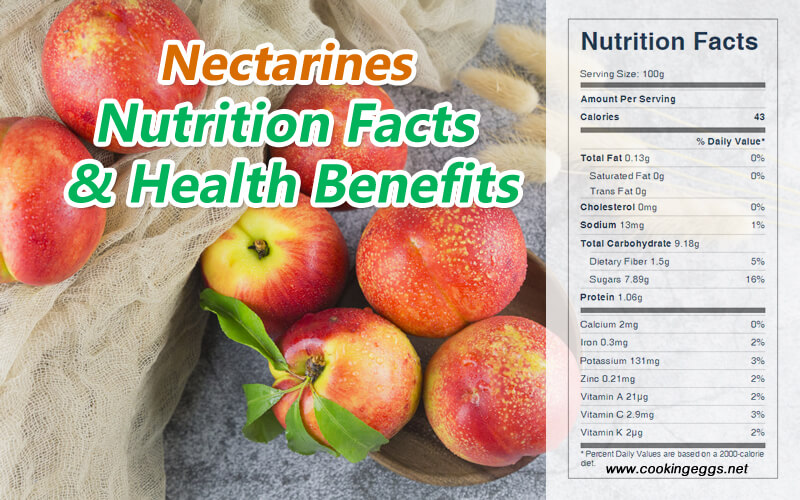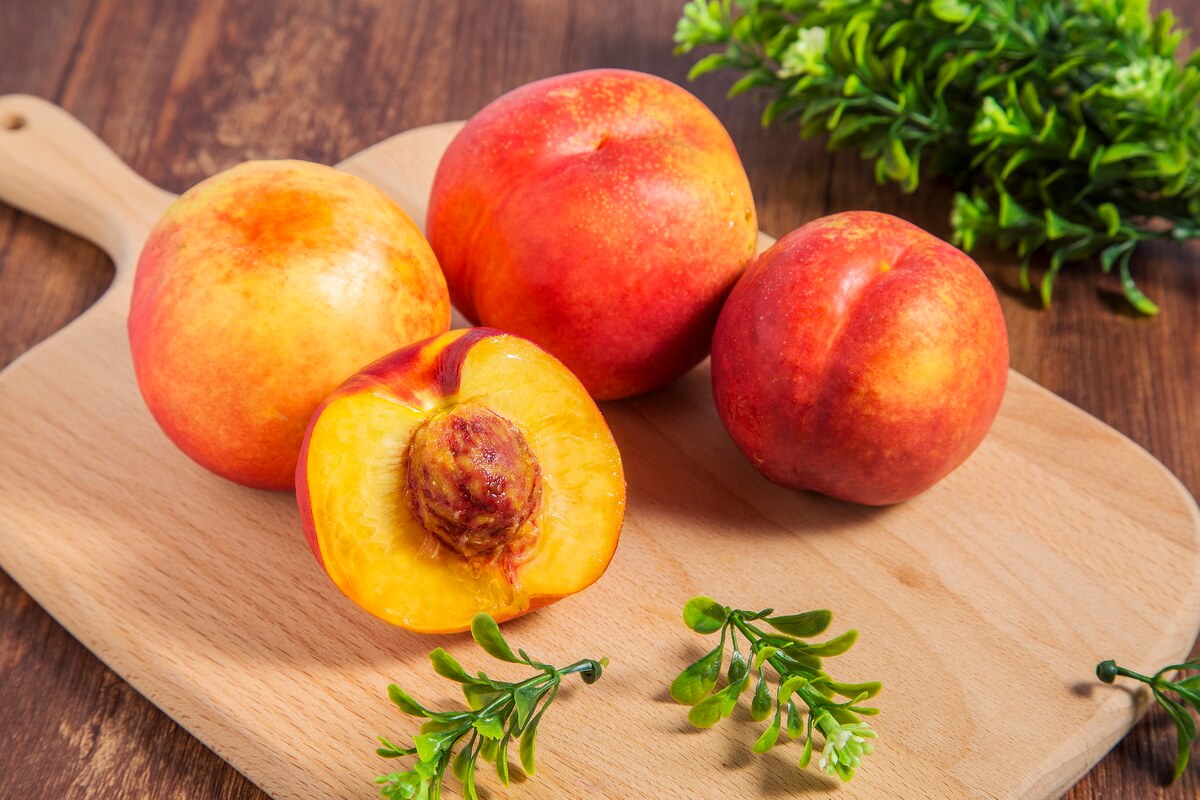Nectarines Nutrition Facts and Health Benefits
Nectarines and peaches are delicious fruits that originated in China. Now they are cultivated widely all over the world. Nectarines are nearly identical to peaches, except that nectarines are slightly smaller and sweeter, and they are also called peaches without the fuzz.
Nectarines are believed to be a natural genetic mutation of a peach. Genetic studies have concluded that nectarines are almost identical to peaches, but nectarines contain a recessive allele that gives them smooth, fuzz-less skin. They are a typical stone fruit with the seed in a hard stone; soft pulpy flesh surrounds the stone, and the surface is covered with a relatively thin skin. The peach and nectarine are closely related to other species of the genus Prunus: apricot, almond, plum, and cherry.

Nutritional Value of Nectarines
Nectarines are an excellent source of vitamin C to strengthen the immune system and vitamin A to maintain healthy organ functioning. The fruits also contain some fiber to regulate the digestive tract, potassium to balance fluid levels within the body, folate to develop red blood cells, and other amounts of zinc, magnesium, copper, phosphorus, calcium, B vitamins, and vitamins E and K.
Nectarine contains 89% water, 9% carbohydrates, and is negligible in protein and fat. 100 grams of raw nectarine provides 43 calories, 9.18 g carbohydrates, 7.89 g sugars, 1.5 g fiber, 1.06 g protein, 0.13 g fat, 21 mcg vitamin A, 2.9 mg vitamin C, 2 mcg vitamin K, 0.61 mg vitamin E, 2 mg calcium, 0.3 mg iron, 8.8 mg magnesium, 131 mg potassium, and 0.21 mg zinc.
Raw Nectarines Nutrition Facts Label

Health Benefits of Nectarines
Eye Health
Nectarine is rich in lutein and zeaxanthin, which are very beneficial for our eye health. Lutein as one of the pigments found in the retina of the eye, may help prevent macular degeneration. Research shows that lutein is a powerful antioxidant which helps to lower the chances of nuclear cataract. Furthermore, nectarine contains beta carotene, which promotes vitamin A synthesis and maintains healthy eyesight by preventing diseases such as xeropthalmia and blindness.
Prevent Cancer
Nectarine is a rich source of bioactives, including vitamin C, phenolic compounds, carotenoids, and anthocyanins. They have antioxidant and anti-inflammatory properties. Antioxidants fight against free radicals and stabilize those free radicals from oxidative damage to our healthy cells. These compounds provide numerous health benefits, such as prevention of tumors and cancers such as colon cancer.
Protect Skin
Nectarine contains multiple antioxidant vitamins and bioflavonoids, which are beneficial to our skin health and help to prevent a variety of skin problems. The antioxidant helps to fight against free radicals and prevent oxidant damage to our skin cells, preventing various types of skin problems such as wrinkles, dark spots, acne, etc.
Preventing Obesity
Nectarine contains high amounts of polyphenols, which possess anti-obesity effects. Several in vitro and in vivo studies have demonstrated the antilipidemic and antiobesity effects of polyphenols, including suppression of adipogenesis and adipocyte proliferation, inhibition of fat absorption, and modulation of energy metabolism and inflammation. Research suggests that dietary polyphenols can modulate the composition and metabolic activity of intestinal microorganisms. Studies show that stone fruits such as nectarines possess bioactive compounds such as catechin, anthocyanins, quercitin derivatives, and chlorogenic acid that have the ability to counteract obesity-related health conditions such as cardiac disorders and diabetes. The anti-diabetic and anti-obesity properties act against metabolic syndrome and lower oxidation of bad cholesterol, which is included in obesity-associated heart diseases.
Lower Risk of Diabetes
Nectarine contains a high amount of dietary fiber, which is very beneficial for our body. Dietary fiber may increase insulin sensitivity in healthy people, in type 2 diabetics, and in individuals with insulin resistance, possibly contributing to a reduced risk of type 2 diabetes.
Health Risk
- The pit of the nectarine contains amygdalin, a compound that is converted to cyanide in the stomach, which is considered toxic when ingested in large quantities and should not be consumed.
- Peach allergy or intolerance is a relatively common form of hypersensitivity to proteins contained in peaches and related fruits (such as almonds). Symptoms range from local effects (oral allergy syndrome, contact urticaria) to more severe systemic reactions, including anaphylaxis (urticaria, angioedema, gastrointestinal and respiratory symptoms).